Real black Houston history – Robert Merritt Catchings: The proud legacy of a Houston historian
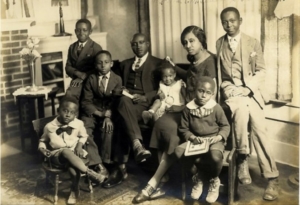
Robert Merritt Catchings and family
(Houston Forward Times) Robert Merritt Catchings was one of those individuals who made a mark for himself and his family in Houston.
Born July 17, 1882, Robert and the Catchings family settled in on a forty-acre farm in Goose Creek, TX, after the Emancipation Proclamation. His father and mother, John Albert and Dilcy Merritt, had nine children; all but one of those children were born in Goose Creek.
In 1888, the family sold their farm and moved to Houston. In 1911, Robert graduated from Prairie View State Normal and Industrial College, “A School for the Colored People of Texas Under State Auspices.”
That same year, Robert taught at Colored High School on San Felipe. In 1915, the Red Book of Houston reports he continued his education in Chicago, IL, and St. Louis, MO, before returning to Texas. He went on to take a position as Assistant Principal at Hempstead High School before accepting an opportunity to take his talents to Jack Yates High School.
Before passing away in 1970, Robert served in World War I. He ran a grocery store on the corner of Dennis and Nagle in Houston’s Third Ward, and was one of the founders of the “Colored Branch of the YMCA.” In addition to being a Principal and Educator, Robert was also a Lawyer, Architect, Mason, Realtor and a Historian. (more)
Two little-known events in Texas that threatened the progression of the Civil Rights movement
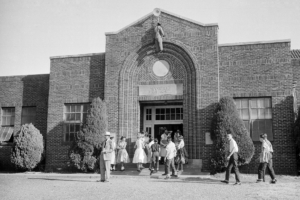
Mansfield High School, 1956, with black effigy hanging above school entrance.
(The Weekly Challenger) Most Americans have learned, or at least heard, about the Little Rock Nine courageously walking to their Arkansas high school in 1957, escorted by federal troops past a mob of hate-spewing racists. But few of us know that this flashpoint in American history was preceded – and maybe even made possible – thanks to a similar event in a small farming town a year before.
When the U.S. Supreme Court ruled on Brown v. Board of Education in 1954, it was supposed to mark the end of “separate but equal” in schools. While many schools, primarily those in West and South Texas, complied with the ruling, others remained segregated. Among them was the town of Mansfield, about 20 miles southeast of Fort Worth, whose residents fought a 10-year battle against integration.
It started on August 27, 1956, when Federal Judge Joe Estes – following months of back and forth between his court and the Fifth Circuit Court of Appeals – issued the state’s first-ever court order for a school to desegregate. Three days later, when Floyd Moody, Nathaniel Jackson, and Charles Moody attempted to register for the fall semester at Mansfield High, Superintendent R.L. Huffman reportedly told one of the students he’d never enter the school. The next day, Governor Allan Shivers sent Texas Rangers to maintain law and order in the event black students tried to enroll again. Defiance of the judge’s orders trickled up and down: Mansfield’s mayor and police chief were complicit, as was President Dwight D. Eisenhower, with whom Gov. Shivers was in good standing. (more)
Recy Taylor, Who Fought for Justice After a 1944 Rape, Dies at 97
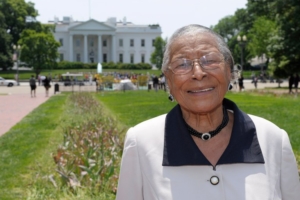
Recy Taylor in 2011 in Lafayette Park in Washington after touring the White House. Credit Susan Walsh/Associated Press
(New York Times) Recy Taylor, a 24-year-old African-American sharecropper, was walking home from church in Abbeville, Ala., on the night of Sept. 3, 1944, when she was abducted and raped by six white men.
The crime was extensively covered in the black press and an early catalyst for the civil rights movement. The N.A.A.C.P. sent a young activist from its Montgomery, Ala., chapter named Rosa Parks to investigate. African-Americans around the country demanded that the men be prosecuted.
But the attack, like many involving black victims during the Jim Crow era in the South, never went to trial. Two all-white, all-male grand juries refused to indict the men, even though one of them had confessed.
Decades passed before the case gained renewed attention, with the publication in 2010 of “At the Dark End of the Street: Black Women, Rape, and Resistance – a New History of the Civil Rights Movement From Rosa Parks to the Rise of Black Power,” by the historian Danielle L. McGuire. The book prompted an official apology in 2011 to Mrs. Taylor by the Alabama Legislature, which called the failure to prosecute her attackers “morally abhorrent and repugnant.”
Mrs. Taylor died in Abbeville on Thursday (Dec. 28), three weeks after the release of “The Rape of Recy Taylor,” a documentary about the crime. She was 97. (more)
Related: “Recy Taylor is ‘a name I know … you should know, too,” Oprah says
TIPHC Bookshelf
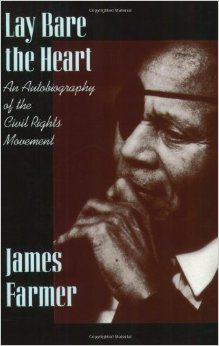 Published scholarship on black history in Texas is growing and we’d like to share with you some suggested readings, both current and past, from some of the preeminent history scholars in Texas and beyond. We invite you to take a look at our bookshelf page – including a featured selection – and check back as the list grows. A different selection will be featured each week. We welcome suggestions and reviews. This week, we offer, “Lay Bare the Heart, An Autobiography of the Civil Rights Movement,” by James Farmer.
Published scholarship on black history in Texas is growing and we’d like to share with you some suggested readings, both current and past, from some of the preeminent history scholars in Texas and beyond. We invite you to take a look at our bookshelf page – including a featured selection – and check back as the list grows. A different selection will be featured each week. We welcome suggestions and reviews. This week, we offer, “Lay Bare the Heart, An Autobiography of the Civil Rights Movement,” by James Farmer.
Texas native James Farmer is one of the “Big Four” of the turbulent 1960s civil rights movement, along with Martin Luther King Jr., Roy Wilkins, and Whitney Young. Farmer might be called the forgotten man of the movement, overshadowed by Martin Luther King Jr., who was deeply influenced by Farmer’s interpretation of Gandhi’s concept of nonviolent protest.
Born in Marshall, Texas, in 1920, the son of a preacher, Farmer grew up with segregated movie theaters and “White Only” drinking fountains. This background impelled him to found the Congress of Racial Equality in 1942. That same year he mobilized the first sit-in in an all-white restaurant near the University of Chicago. Under Farmer’s direction, CORE set the pattern for the civil rights movement by peaceful protests which eventually led to the dramatic “Freedom Rides” of the 1960s.
In Lay Bare the Heart Farmer tells the story of the heroic civil rights struggle of the 1950s and 1960s. This moving and unsparing personal account captures both the inspiring strengths and human weaknesses of a movement beset by rivalries, conflicts and betrayals. Farmer recalls meetings with Franklin and Eleanor Roosevelt, Jack and Bobby Kennedy, Adlai Stevenson (for whom he had great respect), and Lyndon Johnson (who, according to Farmer, used Adam Clayton Powell Jr., to thwart a major phase of the movement).
James Farmer has courageously worked for dignity for all people in the United States. In this book, he tells his story with forthright honesty.
First published in 1985 by Arbor House, this edition contains a new foreword by Don Carleton, director of the Dolph Briscoe Center for American History at the University of Texas at Austin, and a new preface.
This Week in Texas Black History, Jan. 7-13
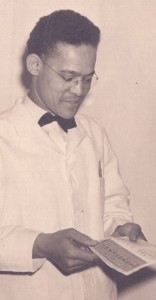
Theodore Roosevelt Youngblood, Sr.
Jan8
Theodore Roosevelt Youngblood, Sr. was born on this day in 1903 in Limestone County (east of Waco). Youngblood was a civic leader and headwaiter at the Driskill Hotel and Stephen F. Austin hotels in Austin. He received a Bachelor of Arts degree in history in 1927 from Samuel Huston College (now Huston-Tillotson University), however, his employment opportunities were limited to jobs such as porter at the Capitol and waiter at Austin hotels. He served as headwaiter at the Driskill and the Stephen F. Austin Hotel from the 1930s until his retirement in 1968. At those hotels, he put together and served receptions, dinner parties, and meetings for prominent white politicians, businessmen, educators, and cattlemen for the Austin area and the state of Texas including President Lyndon B. Johnson and governors Dolph Briscoe, John Connally, and Allan Shivers. Youngblood was chairman of the Negro Chamber of Commerce and president of the Huston College alumni association. He also entertained at his home many well-known black leaders such as NAACP attorney Thurgood Marshall. Youngblood died on February 9, 1993, at age 90.
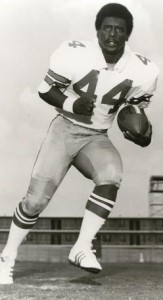
Robert Newhouse
Jan9
On this date in 1950 Dallas Cowboys running back Robert Newhouse was born in Longview. He starred at Galilee High School in Hallsville, situated between Longview and Marshall. The University of Houston was the only major school recruiting offer he received and with the Cougars, from 1969-1971, Newhouse set several rushing records and left the school as its all-time single-season rushing leader with 1,757 yards as a senior. That total, at the time, was the second most rushing yards in a season in NCAA history and earned Newhouse second team All-American honors. He was a second round draft pick by the Cowboys in 1972 and played all of his 12 NFL seasons with Dallas. Newhouse led the team in rushing with 930 yards in 1975.
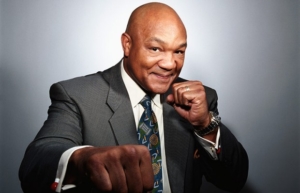
George Foreman
Jan10
On this day in 1949, heavyweight boxing champion and successful entrepreneur George Foreman was born in Marshall. Foreman, who would also become an ordained minister, went from being a street brawler in Houston’s Fifth Ward to the Job Corps program where he became a boxer and won a gold medal at the 1968 Summer Olympics in Mexico City. He won his first heavyweight crown when he defeated Joe Frazier in 1973, then at age 44, became the oldest fighter to win the crown when he defeated Michael Moorer in 1994. Following his boxing career, Foreman became a pitchman for the “George Foreman Lean Mean Fat-Reducing Grilling Machine,” which surpassed sales of 100 million. In 1999, Foreman Grill manufacturer Salton, Inc. paid Foreman $137.5 million in cash and stock for rights to his name and image in what some have called one of the greatest sports marketing deals in history. Foreman was inducted to the International Boxing Hall of Fame on June 8, 2003.

Teresa Graves
Jan10
Teresa Graves, a singer and actress, was born on this day in Houston, in 1949. Graves was a regular on “Rowan & Martin’s Laugh-In” comedy show in 1969 and 1970. She also starred in the television police drama “Get Christie Love” in 1974-75, making her the first African American woman to star in her own hour-long drama television series.
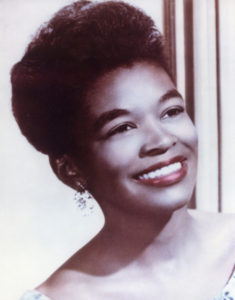
Thelma Joyce White
Jan10
Thelma Joyce White was born on this day in 1936 in Marlin. In March 1955, lawyers including the NAACP’s Thurgood Marshall, acting in her behalf filed suit in federal court seeking her admission to Texas Western College, part of the University of Texas System. Before White’s case, the law and medical schools and several graduate programs had been opened to blacks, but all undergraduate schools in Texas remained closed. White won the suit and blacks were admitted to TWC and other public universities in Texas. Ironically, White never attended the school, choosing instead to remain at nearby New Mexico A&M in Las Cruces where she had already begun studies.
Jan11
On this day in 1945, Secretary of the Treasury Henry Morgenthau Jr., honored Houston’s Hugh McElroy for participating in bond drives as a speaker and poster model. McElroy was reportedly the first African American whose picture appeared as an advertisement for U.S. war bonds. At age 14, McElroy, a Kentucky native, lied about his his age and enlisted in the Tenth Cavalry. He served in Cuba in the Spanish-American War, in the Philippine Insurrection, and on Gen. John Pershing’s expedition into Mexico. Highly-decorated, McElroy retired in 1927 and settled in Houston.
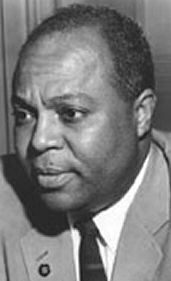
James Farmer, Jr.
Jan12
Civil Rights activist James Farmer, Jr. was born on this day in 1920 in Marshall. A graduate of Wiley College, in 1942, Farmer co-founded and was national director of the Congress of Racial Equality which originated integrated bus trips through the South, called “Freedom Rides” to challenge local efforts to block the desegregation of interstate busing, and to support passage of Civil Rights and Voting Rights acts in the 1960s. As a result of CORE’s efforts, more than 100 Southern bus terminals were desegregated. In 1998, Farmer was awarded the Presidential Medal of Freedom.
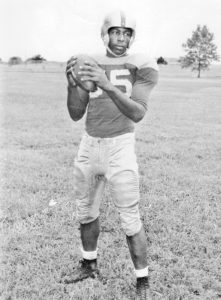
Charlie “Choo Choo” Brackins
Jan12
Charlie “Choo Choo” Brackins was born this day in 1932 in Dallas. Brackins starred as a quarterback at Prairie View A&M, leading the Panthers to 33 wins in the 37 games he played from 1951 to 1955. In his brief (seven games) National Football League career, Brackins was a 16th round pick by the Green Bay Packers in the 1955 draft. On October 23,1955, Brackins played the final minutes of a game against the Cleveland Browns, making him the fourth black quarterback to play in an NFL game and the first player from an HBCU to play quarterback in the NFL. Brackins was voted to the Black College Football Hall of Fame with the 2013 class. He was a two-time Pittsburgh Courier All-American (1953 and 1954) and led PV to three Southwestern Athletic Conference championships (1952, 1953, 1954) and two Black College National Championships (1953 and 1954).
Blog: Ron Goodwin, Ph.D., author, PVAMU history professor
Ron Goodwin’s bi-weekly blog appears exclusively for TIPHC. Goodwin is a San Antonio native and Air Force veteran. Generally, his column addresses contemporary issues in the black community and how they relate to black history. He and the TIPHC staff welcome your comments.
Latest Entries
A New Hope
Forgive me for borrowing the title of one of the most profitable films in history, “Star Wars: A New Hope.” I’ve always been enamored by space. I’m a child of the 1960s and I remember playing with my Major Matt Mason action figure (not a doll!) as my family [...]
Tell me the truth
Democracy – a) government by the people, b) a government in which the supreme power is vested in the people and exercised by them, directly or indirectly through a system of representation usually involving periodically held free elections. Merriam-Webster Dictionary There were many things I learned from my father. [...]
Submissions Wanted
Historians, scholars, students, lend us your…writings. Help us produce the most comprehensive documentation ever undertaken for the African American experience in Texas. We encourage you to contribute items about people, places, events, issues, politics/legislation, sports, entertainment, religion, etc., as general entries or essays. Our documentation is wide-ranging and diverse, and you may research and write about the subject of your interest or, to start, please consult our list of suggested biographical entries and see submission guidelines. However, all topics must be approved by TIPHC editors before beginning your research/writing.
We welcome your questions or comments. Please contact Mr. Michael Hurd, Director of TIPHC, at mdhurd@pvamu.edu.
